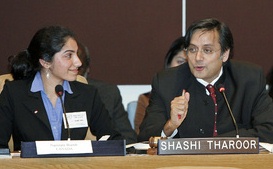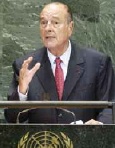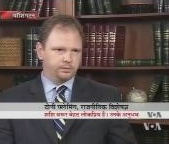Readers from India may be interested in watching my interview with Niharika Acharya, cohost of the weekly news program Duniya this Sunday evening, 18 June at 7:00pm in India.

 The long anticipated announcement of Shashi Tharoor’s nomination was made this week, surprising both no one and many, but perhaps none more so that the South Korean, Sri Lankan and Thai governments, which had strongly wagered on India’s support.
The long anticipated announcement of Shashi Tharoor’s nomination was made this week, surprising both no one and many, but perhaps none more so that the South Korean, Sri Lankan and Thai governments, which had strongly wagered on India’s support.
Tharoor’s eloquence, pleasant nature and cosmopolitan background have for years made him a popular candidate for the world’s top diplomatic post. But unlike Bill Clinton or Tony Blair, he has a reasonable chance of getting a nod from the Security Council. His experience and credentials alone make him a viable candidate.
His background and nationality are likely to be looked on favorably by the Asian group and more broadly from Southern governments. His awareness of having to include Southern interests in the UN’s work may help may help win support for necessary management reforms, which would in turn make wealthier governments happier over the organization’s fiscal management.
Beijing and Washington’s interests are important for any candidate, but have a particularly interesting twist for Tharoor. Both governments were no doubt consulted regarding Tharoor’s nomination, as would have been London, Paris, Moscow and other important nations, and apparently did not react negatively. Pranay Gupte, an Indian-American journalist who covered the UN for many years, noted that “Countries don’t make nominations to be embarrassed… That India made a nomination, says a lot.”
China and India have long competed for leadership within the region and the larger developing world, but China has recently committed to forming more strategic and cooperative ties with India. Plus China has all but stated it is not happy with Tharoor’s competitors, but will not let a non-Asian assume the post.
The United States’ pursuit of a nuclear exchange program with India could translate into support for the country’s nominee, but no doubt some in the administration would have preferred an outsider. U.S. Ambassador John Bolton’s hope of cleaning house is not likely to come to fruition should Tharoor get the nod. Added to this is the general U.S. position that the UNSG is to be more “secretary” than “general” and not presume an air of independence in the job.
Japan – also on the Security Council – may favor Tharoor over his Asian colleagues both due to his support for reform and its shared desire with India for a permanent seat at the Security Council table.
Two factors may give pause to Tharoor’s candidacy however.
India is a big country, and others have already pointed out that big countries – particularly those with nuclear weapons – don’t field candidates for UNSG. Pakistan has already suggested it might nominate its own candidate, simply as a response to the Indian nomination. India is also an increasingly important leader on global issues, which may worry others, despite the UNSG’s nominal independence from national politics. Fortunately, Tharoor’s non-involvement in Indian politics may mitigate this factor.
However, his own popularity both as an author and an international civil servant may concern some governments, such as the U.S., which would prefer the UNSG to rely on their beneficence rather than possess a popular following.
(Fun fact: Tharoor’s most recent novel, Bookless in Baghdad, rose from #386,452 to #59,612 on Amazon.com in the last 24 hours.)
All together, however, Tharoor knows what an impossible job he could be getting himself into. And despite this, he still deserves the strongest consideration by the world’s governments.
Update: In addition to India’s campaign for a permanent Security Council seat, it has also pushed for the Security Council to submit three UNSG nominees for consideration by the General Assembly. Yesterday, however, Tharoor himself noted that the proposal for multiple nominees appears to have lost steam. No surprise, now that India has its favorite son up for the office, but still a development for which Tharoor himself is probably relieved.
 Such lobbying may have been falling on deaf ears, if Anne Elisabeth Moutet, a free lance journalist in Paris, is correct. Ms. Moutet was interviewed today by BBC and PRI’s The World on the opening of a museum on indigenous art in Paris, during which she made the suggestion that President Chirac may have his own ambitions for the post.
Such lobbying may have been falling on deaf ears, if Anne Elisabeth Moutet, a free lance journalist in Paris, is correct. Ms. Moutet was interviewed today by BBC and PRI’s The World on the opening of a museum on indigenous art in Paris, during which she made the suggestion that President Chirac may have his own ambitions for the post. 


 The long anticipated announcement of
The long anticipated announcement of  Haya Rashed Al Khalifa,
Haya Rashed Al Khalifa,  Secondly, her election may also knock one of the male candidates out of the running for UNSG. Jordan’s Prince Zeid has been a dark horse for months, and is believed
Secondly, her election may also knock one of the male candidates out of the running for UNSG. Jordan’s Prince Zeid has been a dark horse for months, and is believed 



